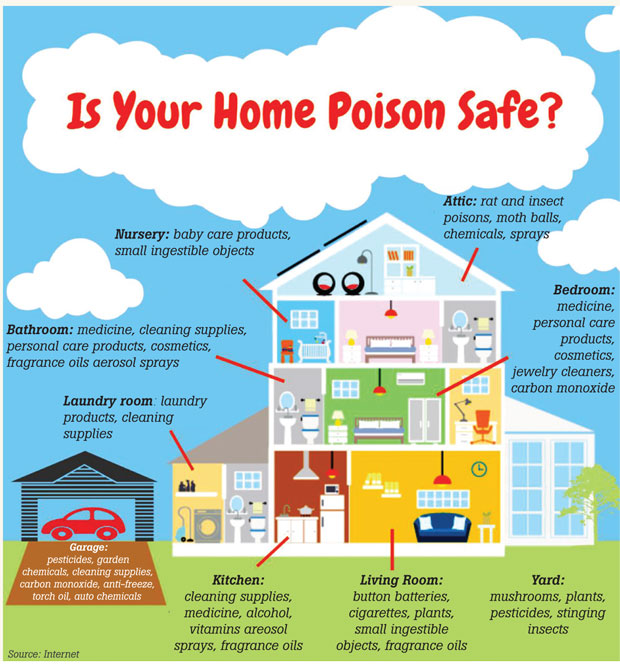03 Nov 2017 - {{hitsCtrl.values.hits}}
 Household poisoning is viewed as a global crisis. The elderly in modern Sri Lanka get hospitalized mostly by poisoning themselves. The young generation experiences poisoning due to individuals being unable to deal with life’s pressing issues. According to the records that reveal the number of hospitalizations due to poisoning, the highest number of such cases involve children who mistakenly poison themselves. This article emphasizes on the ways to minimize household poisoning.
Household poisoning is viewed as a global crisis. The elderly in modern Sri Lanka get hospitalized mostly by poisoning themselves. The young generation experiences poisoning due to individuals being unable to deal with life’s pressing issues. According to the records that reveal the number of hospitalizations due to poisoning, the highest number of such cases involve children who mistakenly poison themselves. This article emphasizes on the ways to minimize household poisoning.
The common poisons largely contributing to household poisoning are categorized into three basic groups.
1 Chemicals (Weed killers and other chemicals)
2 Medicine
3 Types of trees in the natural environment ( Trees, micro organisms and the fungi inhabited poisons.)
The weedkillers
Parents and caretakers can simply save their children from poisoning accidents by carefully storing and locking poisonous materials and keeping such products away from children. According to studies done regarding this matter, it was revealed that weedkillers are stored insecurely in nearly half of the houses where there are children below age 5.
Tips for prevention 
Other chemicals
Kerosene, various types of batteries (remote controls, mobile phones and numerous other batteries of electric devices), household cleaners (tile cleaners, grout cleaners, toilet cleaners etc.) liquid soaps and detergents, fabric softeners, air freshners, body lotions, nail polish removing chemicals, and shampoos must be stored safely, out of the reach of children.
Medicinal poison
Paracetamol complications are another common issue. Children are given paracetamol several times during a day. This drug must be administered according to the weight of the child, as prescribed in the label or according to the doctor’s prescription. Even though Paracetamol should be given once every six hours, if fever surfaces again before the end of the six-hour duration, another dose could be given after four hours after the first dose. Then the next dose should be given after eight hours. But these pain killers are not recommended for more than four dosages a day.

Poisonous trees and seeds
Get to know the poisonous trees in your garden or area and keep them out of reach of children. Advise the children not to eat unfamiliar seeds, fruits and leaves. The Yellow oleander plant, best known as Kaneru is a harmful poisonous plant. This plant commonly grows in the gardens in most provinces. Every part of this tree contains highly poisonous substances. Therefore, it is safer not to grow this plant in the garden if there are children at home.
Safety measurements
The most important step will be to follow the medical instructions immediately. Meanwhile read the product label and do accordingly. Do not try to vomit without the recommendation of a qualified doctor during a case of poisoning. Because some chemicals can destroy the mucous membrane of mouth and esophagus. And the vomiting can lead the food or the poison to enter the lungs. The chemicals entering the body this way can cause respiratory problems as well as infections.
Reference - booklet published by Sri Lanka Medical Association
23 Dec 2024 2 hours ago
23 Dec 2024 3 hours ago
23 Dec 2024 3 hours ago
23 Dec 2024 4 hours ago
23 Dec 2024 5 hours ago